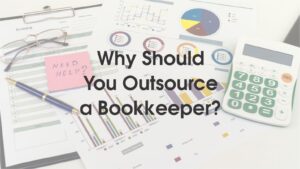10 Tips for Making a Good Small Business Accountant Even Better
Introduction to Small Business Accountant :
When running a small business accounting Firm, proper financial management is essential for success. Amidst the myriad of responsibilities that come with entrepreneurship, effectively managing your business’s finances can be a daunting task. This is where a skilled and knowledgeable business accountant can make a significant difference.
A business accountant is a financial expert who specializes in helping small businesses navigate the intricacies of financial reporting, tax obligations, and overall financial health. They are well-versed in the nuances of small business finances and can provide valuable insights and strategies to support your business’s growth and stability.
This article will explore ten valuable tips to help you make the most of your business accountant and elevate their contribution to your business. By implementing these tips, you can strengthen your partnership with your accountant and ensure they have the necessary information and resources to support your financial goals.
From clearly defining your business goals to embracing technology and staying updated on tax regulations, each tip is designed to enhance the effectiveness and efficiency of your small business accounting practices. We will also delve into the role of an accountant for small businesses, highlighting the various responsibilities they fulfil and the benefits they bring.
Additionally, we will discuss common mistakes to avoid in small business accounting. By being aware of these pitfalls and working closely with your accountant to avoid them, you can maintain accurate financial records, make informed financial decisions, and ensure compliance with regulations.
Your small business accountant is not just a number cruncher; they are a valuable partner who can provide expert financial advice, help you navigate complex financial matters, and contribute to your business’s overall growth and success. So let’s delve into these ten tips and discover how to make a good business accountant even better.
Clearly Define Your Business Goals:
Communicate your short-term and long-term objectives and any specific financial targets you want to achieve. By aligning your goals with your accountant’s expertise, they can provide valuable insights and strategies to help you reach those milestones.
Regularly Communicate and Collaborate:
Maintaining open lines of communication is crucial for a successful partnership with your business accountant. Schedule regular meetings to discuss financial matters, provide updates on your business, and address any concerns. This collaborative approach fosters a strong working relationship and ensures that your accountant stays well-informed about your business’s financial status.
Leverage Technology:
The accounting landscape constantly evolves, and technology plays a vital role in streamlining financial processes. Explore accounting software and cloud-based tools that can automate tasks, simplify record-keeping, and enhance efficiency. Discuss with your business accountant the best technology solutions to implement for your business, as they can provide valuable guidance based on their expertise.
Stay Updated on Tax Regulations:
Tax compliance is a critical aspect of running a small business. Tax regulations can be complex and subject to change, so staying informed is important. Your small business accountant can help you understand the latest tax laws and ensure your business remains compliant. By working together, you can identify potential tax benefits or credits that could reduce your tax burden.
Monitor Cash Flow:
Maintaining a healthy cash flow is vital for the success of any small business accounting Firm. Your business accountant can help you track and analyze cash flow patterns, identifying areas where you can optimize revenue and reduce expenses. By closely monitoring your cash flow, you can make informed decisions contributing to your business’s financial stability and growth.
Implement Effective Financial Controls:
To safeguard your business’s financial health, it’s crucial to implement effective financial controls. Our best business accountant service can help establish internal processes and systems to prevent fraud, manage expenses, and ensure accurate financial reporting. Regularly review these controls with your accountant to identify any areas that need improvement.
Plan for the Future:
A skilled business accountant can go beyond managing day-to-day financial operations. They can help you develop a strategic financial plan for the future. Work closely with your accountant to create realistic budgets, forecast financial projections, and explore investment opportunities. By proactively planning for the future, you can make sound financial decisions and position your business for long-term success.
Assess Performance and KPIs:
Measuring your business’s performance is essential to gauge its overall health and identify areas for improvement. Collaborate with your small business accountant to establish key performance indicators (KPIs) that align with your goals. Regularly review these metrics together, as your accountant can provide valuable insights and recommendations to enhance your business’s financial performance.
Engage an Accounting Firm for Specialized Services:
As your small business grows, you may require additional expertise in specific areas of accounting. Engaging an accounting firm specializing in small businesses can provide access to a wider range of services, such as tax planning, auditing, and financial consulting. Consult with your best business accountant service to determine if engaging an accounting firm would benefit your business. They can recommend reputable accounting firms that have experience working with small businesses and can provide the best business accountant service tailored to your needs.
Review and Learn from Financial Reports:
Financial reports are valuable tools that provide insights into your business’s financial health and performance. Regularly review and analyze these reports with your business accountant. They can help you interpret the data, identify trends, and make informed decisions based on the information presented. By learning from your financial reports, you can identify areas of strength, address weaknesses, and make strategic adjustments to improve your business’s financial position.
Why Your Small Business Needs an Accountant:
Running a small business involves wearing multiple hats and juggling numerous responsibilities. While you may be adept at managing certain aspects of your business, the financial intricacies often require specialized knowledge and expertise. This is where a business accountant becomes an indispensable asset. Here are key reasons why your small business needs an accountant:
Expert Financial Advice:
Navigating the financial landscape of a small business can be complex. An accountant brings a wealth of financial knowledge and expertise to the table. They are trained to handle various financial matters and can provide valuable advice tailored to your business’s needs. Whether creating a budget, analyzing financial statements, or making informed financial decisions, an accountant’s guidance can help you optimize your financial strategies.
Tax Compliance and Planning:
Tax regulations are ever-changing and can be challenging to navigate. An accountant ensures that your small business complies with tax laws and regulations, minimizing the risk of penalties and audits. They stay up-to-date with the latest tax requirements and can help you take advantage of available deductions, credits, and incentives. By working closely with your accountant, you can implement effective tax planning strategies to minimize tax liability and optimize your financial position.
Financial Organization:
Maintaining organized financial records is crucial for accurate reporting, decision-making, and financial planning. An accountant can help you establish effective bookkeeping systems and processes, ensuring that your financial records are accurate, up-to-date, and easily accessible. Maintaining proper documentation and organization allows you to streamline financial processes and clearly understand your business’s financial health.
Financial Analysis:
Interpreting financial data is key to understanding the performance and profitability of your small business. Accountants are skilled in analyzing financial statements, identifying trends, and providing valuable insights into your business’s financial health. They can help you assess your revenue streams, expenses, profit margins, and cash flow to make informed decisions and take proactive measures to improve your business’s financial performance.
Business Growth and Expansion:
As your small business grows, strategic financial planning becomes increasingly important. An accountant can play a crucial role in analyzing financial forecasts, evaluating investment opportunities, and assessing the feasibility of expansion initiatives. They can provide valuable insights into financial risks and opportunities, helping you make informed decisions that support your business’s growth and expansion goals.
Financial Risk Management:
Identifying and managing financial risks is vital for the long-term sustainability of your small business. An accountant can help you assess and mitigate financial risks such as cash flow fluctuations, market volatility, and changing economic conditions. They can provide guidance on contingency planning, risk mitigation strategies, and ensuring adequate financial reserves to navigate unforeseen circumstances.
Time and Resource Savings:
Outsourcing your accounting tasks to a professional accountant lets you focus on your core business activities. Instead of spending hours poring over financial spreadsheets and tax documents, you can leverage the expertise of an accountant to handle these responsibilities. This saves you time and ensures that financial tasks are handled accurately and efficiently, giving you peace of mind and the freedom to concentrate on growing your business.
Role of an Accountant for Small Businesses:
In the intricate world of small business finances, the role of an accountant is vital. Accountants bring their expertise and specialized knowledge to assist small business owners in managing their financial affairs effectively. Let’s delve into the key roles that accountants play in supporting
small businesses:
Financial Record-Keeping and Bookkeeping:
One of the fundamental responsibilities of an accountant is to maintain accurate financial records. They ensure that all financial transactions are properly recorded, organized, and classified. This includes managing accounts payable and receivable, reconciling bank statements, and maintaining general ledgers. By keeping financial records current and accurate, accountants provide a solid foundation for financial analysis and decision-making.
Financial Reporting and Analysis:
Accountants are skilled in preparing and interpreting financial statements, such as balance sheets, income, and cash flow statements. They analyze the financial data to provide insights into the business’s performance, profitability, and liquidity. Through financial analysis, accountants help small business owners understand their strengths and weaknesses, identify trends, and make informed decisions to improve overall financial health.
Tax Planning and Compliance:
Navigating the complexities of tax regulations is daunting for small business owners. Accountants play a crucial role in tax planning and compliance. They stay updated on tax laws and regulations, ensuring the business remains compliant and taking advantage of available tax incentives and deductions. Accountants prepare and file tax returns accurately and on time, minimizing the risk of penalties and ensuring the business’s tax obligations are met.
Financial Planning and Budgeting:
Accountants assist small business owners in developing comprehensive financial plans and budgets. They analyze historical financial data, market trends, and business goals to create realistic forecasts and projections. Accountants help set financial goals, identify potential risks, and develop strategies to achieve financial targets. With their expertise, they guide small business owners in making financial decisions that align with the long-term goals and sustainability of the business.
Cash Flow Management:
Managing cash flow is crucial for the survival and growth of a small business. Accountants play a vital role in monitoring and managing cash flow. They analyze the timing of cash inflows and outflows, identify potential cash flow gaps, and recommend strategies to optimize cash flow. By closely monitoring cash flow and implementing effective cash management techniques, accountants ensure the business has sufficient liquidity to meet its financial obligations.
Financial Advice and Business Consulting:
Accountants serve as trusted advisors to small business owners, providing valuable financial advice and business consulting services. They analyze financial data, interpret trends, and offer insights to help make informed decisions. Accountants assist in identifying cost-saving opportunities, evaluating investment options, and assessing the financial implications of business decisions. Their guidance and expertise help small business owners navigate financial challenges and make strategic choices to drive growth and profitability.
Auditing and Compliance:
Accountants are crucial in ensuring internal controls and compliance within the business. They conduct internal audits to assess financial controls’ effectiveness and identify improvement areas. Accountants assist with regulatory compliance, including adherence to accounting standards and industry regulations. Their expertise helps minimize the risk of financial irregularities, fraud, and non-compliance.
Financial Reporting:
Accountants prepare regular financial reports, including profit and loss statements, balance sheets, and cash flow statements. These reports provide insights into your business’s financial performance and help you track progress towards your goals.
Tax Planning and Preparation:
Accountants assist in tax planning to minimize your tax liability. They ensure accurate and timely preparation of tax returns, including business taxes, payroll taxes, and sales taxes. They keep abreast of tax laws and changes to ensure compliance.
Financial Analysis and Interpretation:
Accountants analyze financial data, identify trends, and provide meaningful insights into your business’s financial health. They can offer recommendations for improving profitability, reducing costs, and managing cash flow effectively.
Mistakes to Avoid for Small Business Accounting:
While a small business accountant can provide invaluable support, it’s important to be aware of common mistakes to avoid. Here are a few:
Lack of Communication:
Failing to communicate regularly with your accountant can lead to misunderstandings and missed opportunities. Maintain open lines of communication and provide timely updates on your business’s financial activities.
Neglecting Financial Planning:
Engaging in proactive financial planning can hinder your business’s growth and success. Work closely with your accountant to develop a strategic financial plan that aligns with your goals and ensures long-term stability.
Misclassifying Expenses:
Improperly categorizing expenses can lead to inaccurate financial statements and tax filings. Ensure to maintain clear and accurate records of your expenses and consult with your accountant to ensure proper classification.
Ignoring Cash Flow Management:
Neglecting cash flow management can create cash shortages and hinder your ability to meet financial obligations. Regularly review cash flow statements with your accountant and implement strategies to improve cash flow, such as optimizing payment terms and managing inventory efficiently.
Failing to Stay Updated on Tax Regulations:
Tax laws and regulations change frequently, and failing to stay updated can result in non-compliance and potential penalties. Rely on your accountant to stay informed about tax changes and ensure your business remains compliant.
Overlooking Financial Controls:
Inadequate financial controls can increase the risk of fraud and errors. Implement internal controls, such as segregation of duties and regular financial audits, to safeguard your business’s finances. Your accountant can assist in establishing effective financial controls.
Not Leveraging Technology:
Technology can streamline financial processes and enhance efficiency. Embrace accounting software and digital tools recommended by your accountant to automate tasks, improve accuracy, and gain real-time insights into your business’s financial health.
Seek Professional Advice for Business Growth:
As your small business expands and faces new challenges, seeking professional advice from your accountant becomes even more crucial. They can provide insights on financial strategies to fuel growth, such as securing funding, managing capital investments, and exploring expansion opportunities. By leveraging their expertise, you can confidently navigate the complexities of business growth.
Maintain Ethical Standards and Trust:

Integrity and trust are paramount when working with a small business accountant. Ensure your accountant operates with the highest ethical standards and maintains client confidentiality. This includes protecting sensitive financial information and adhering to professional codes of conduct. By establishing a relationship based on trust, you can confidently rely on your accountant’s advice and expertise.
Lack of Document Organization:
Disorganized financial documents can lead to confusion and inefficiencies. Make sure to keep all financial records organized and readily accessible. Implement a system for filing and storing invoices, receipts, bank statements, and other important financial documents.
Inadequate Separation of Personal and Business Finances:
Mixing personal and business finances is a common mistake that can lead to complications and make tax filing more challenging. Establish separate bank accounts and credit cards for your business, and ensure that personal expenses are not mistakenly categorized as business expenses.
Failure to Reconcile Accounts Regularly:
Reconciliation is a critical process that involves comparing your financial records with bank statements to identify discrepancies and errors. Neglecting to reconcile your accounts regularly can result in inaccurate financial statements and missed transactions. Work closely with your accountant to establish a reconciliation schedule and ensure it is followed consistently.
Overlooking Deductible Expenses:
Small business owners often miss out on valuable tax deductions by failing to properly track and document eligible expenses. Please consult your accountant to identify deductible expenses specific to your industry and ensure you have the necessary documentation to support them.
Not Monitoring Key Performance Indicators (KPIs):
Monitoring key performance indicators (KPIs) is essential for assessing your business’s financial health and success. Please work with your accountant to identify relevant KPIs for your business and regularly review them to gain insights into your performance and make data-driven decisions.
Delaying Tax Preparation and Filing:
Procrastinating on tax preparation and filing can lead to unnecessary stress and potential penalties for late submission. Establish a timeline in consultation with your accountant to ensure that tax-related tasks are completed well before the deadline. This will give you ample time to review and address any issues.
Failing to Plan for Business Expenses and Taxes:
Unexpected business expenses and tax obligations can catch you off guard if you haven’t planned for them. Work with your accountant to create a budget that factors in anticipated expenses and set aside funds for tax payments. This will help you avoid cash flow issues and meet your financial obligations promptly.
Conclusion:
Avoiding these common mistakes can significantly improve the effectiveness and efficiency of your small business accounting practices. By staying organized, separating personal and business finances, reconciling accounts regularly, and monitoring key financial indicators, you can ensure accurate financial reporting and make informed decisions for your business’s success. Working closely with your small business accountant and seeking their guidance will help you navigate potential pitfalls and optimize your financial management processes. Remember, proactive and diligent accounting practices are key to maintaining a healthy financial foundation for your small business. We provide online small business accounting services to help your business grow.




